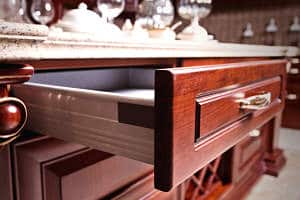Best Way to Move a Dresser with Drawers

"*" indicates required fields

What is the best way to move a dresser?
Dresser drawers, a frequent topic of moving inquiries, prompt us to address the common concerns surrounding their relocation.
Dressers, wardrobes, and desk drawers serve as valuable storage for clothing, papers, jewelry, and miscellaneous items. Yet, as you load more into a dresser, its weight increases significantly. Even without contents, most dressers are inherently heavy, averaging between 100 to 150 pounds. Let’s delve into some insights about moving these substantial furniture pieces.
So, the best way to move a dresser includes making it as light as possible.
Do I need to empty the dresser drawers?
To make an informed decision about whether to leave items in drawers during a move, there are several important considerations to keep in mind. Let’s delve into these aspects more thoroughly.
Firstly, it is true that emptying the drawers of a dresser makes the furniture lighter, which in turn makes it easier to move. Dressers are not specifically designed for frequent relocation and can be quite delicate. During the move, one of the most susceptible parts to breakage is the hardware that enables the smooth sliding of drawers. This vulnerability is particularly heightened if the drawers are filled with heavy items. By emptying the drawers, you can minimize the strain on the hardware and reduce the chances of damage.
Another significant factor to consider is the potential risk to the drawers themselves. If the drawers are filled with clothing or other loose and fragile items, the bottoms of the drawers may give way under the weight and cause them to fall out. This can result in damage not only to the drawer but also to the belongings inside. By emptying the drawers, you can alleviate this risk and ensure the safety of your items.
It’s also worth noting that loose small items, like office supplies or craft materials, tend to shift during the move. This movement can result in damage to the drawer or the items themselves. Liquids and gels, such as makeup or hair styling products, may leak and cause harm to both the furniture and other belongings. Sharp items, if left in the drawers, can scratch or dent the wood, further compromising the integrity of the dresser.
How to Keep Drawers Closed When Moving
How to Keep Drawers Closed and Protected During a Move
When moving a dress or furniture with drawers, preventing it from opening and getting damaged is essential. Depending on the piece’s weight, age, and structure, several effective methods exist to keep drawers secure and your belongings safe.
Top Ways to Secure Drawers for Moving:
-
Packing Tape:
Apply strong packing tape across the front of the drawers to keep them tightly shut during transit. To prevent sticky residue, avoid tapping directly onto finished wood. -
Plastic Wrap:
Wrap the drawer area with multiple layers of plastic wrap. This seals the drawers closed. -
Moving Blankets:
Cover the entire piece with thick moving blankets. Then, use tape or stretch wrap to secure the blankets. This will protect the furniture from dings and scratches and keep drawers closed. -
Stretch Wrap:
Ideal for wrapping over moving blankets or directly around the drawers. Stretch wrap clings to itself and offers added support to hold everything in place. -
Cardboard Protection:
Remove the drawers, cover each drawer with cardboard pieces to create a lid, tape them onto the drawers, and move them separately. You can also attach cardboard to the outside of the furniture as an extra layer to protect the woodwork, edges, and ornate areas or corners.
Secure to Ensure the Safety of Items Left in Dressers
While it is essential to consider the weight and delicacy of dressers, it is equally crucial to consider the safety of your belongings during transport. Fragile items, such as glassware, porcelain pieces, and electronics, require special care and attention during a move. These delicate items can easily break if left inside the drawers, leading to irreparable damage. Consider using drawer dividers to prevent delicate or smaller objects from sliding around and potentially causing damage. Additionally, heavy items, such as books or tools, should not be left in the drawers as they contribute to the overall weight and increase the potential for accidents and injuries.
Lastly, it is essential to exercise caution regarding valuable items and important documents. Leaving items of high value, such as jewelry, electronic gadgets, or antique pieces, in the drawers poses a significant risk of loss or damage during the move. Similarly, important documents should never be left in drawers, as their loss or damage can lead to considerable inconvenience and stress.
In summary, taking into account the ease of movement, the safety of your belongings, and the stress on the drawers and hinges, it is strongly recommended to empty the drawers of a dresser before moving it. By doing so, you can minimize the chances of damage to both the furniture and its contents, ensuring a smoother and more secure transition to your new location.
Can I leave anything in the drawers?
We understand that some items are small and do not appear to add much weight to a dresser. However, we advise removing everything.
There is always a tiny chance that the dresser drawers may open in the truck during the move. If this happens, anything inside the drawer could get tossed around in the moving truck.
Additionally, movers may need to tip your dresser to move it downstairs or turn it sideways to get around tight corners or through doorways. If this happens, the truck’s movement could toss anything inside the drawer around.
The safety of your belongings is our top priority. Therefore, we advise you to empty all contents from the drawers before moving them. We recommend packing them in separate boxes. As a result, we can assure you that your dresser and other possessions arrive safely.
How should I pack the stuff I remove from my dresser?
It is highly recommended to pack clothing in suitcases or small to medium-sized boxes. Other alternatives include plastic totes or even contractor-strength garbage bags. All of these containers are acceptable for moving and storing clothing.
If you are packing away papers, we recommend using a box designed for file folders or file boxes. These are ideal for keeping papers flat and wrinkle-free.
Additionally, wrap and pack small, fragile, or valuable items separately, and clearly mark these boxes as fragile to ensure movers handle them with extra care.
Do the movers pack and wrap my dresser for the move?
Dressers require protective wrapping to keep them from harm while moving. Our professional movers use heavily padded blankets that are specially made for moving. These protective blankets provide extra padding to protect your dresser from scuffs, scratches, and dings during the moving process. So, your dresser will have the extra cushioning it needs.
The movers will hold the moving blanket in place using either tape or an extra-large rubber band designed for moving. After securing the blanket to the empty dresser, they will wrap it in shrink wrap to protect it, secure it, and bind the dresser drawers together.
Shielding from Scratches and Tears
In the world of efficient moving, using plastic wrap becomes a top-notch strategy to keep your cherished belongings safe. The shrink wrap acts like a reliable shield, helping to keep the dresser clean, guarding against scratches, making it easier to grip and, therefore, easier to move.
Smart Drawer Security
A clever use of plastic wrap is securing the drawers of your nightstand or dresser during the move. This proves especially important when navigating stairs or maneuvering items to and from the moving truck. The tear-resistant nature of plastic wrap adds an extra layer of defense against accidental rips, providing robust protection for your belongings.
Facing the Elements: Water-Resistant Defense
Moreover, the water-resistant quality of plastic wrap offers additional protection, proving invaluable when dealing with unpredictable weather during a move. Whether it’s rain or unexpected moisture, the impermeable properties of plastic wrap ensure your items stay shielded throughout the entire moving process.
Practical Benefits of Plastic Wrap
Using plastic wrap during a move offers practical advantages. Its clingy properties are highly useful for securing various items, keeping the glass in a table intact and folding large items like rugs compactly. Acting as a protective layer, plastic wrap prevents scratches and damage to your belongings during transportation.
Securing Drawers and More
An essential benefit of using plastic wrap is its ability to keep empty dresser drawers closed. This is especially crucial when navigating stairs or loading and unloading items from the moving truck. The tear-resistant and water-resistant features of plastic wrap ensure it remains intact and effective throughout the moving process.
Empty drawers in these other types of furniture
Be sure to follow the same guidelines for all furniture with drawers. We assure you that you and your belongings will have a safe move. Bottom Line: If you are moving furniture with drawers, they MUST be emptied by the customer before the move to reduce the risk of damage.
- Desk
- Filing Cabinet
- Dressers
- Tables with drawers
- Beds with drawers
- Nightstand
- Armoire
- Entertainment Center
- Sideboard
- China Closet
If you have any concerns about moving or would like to begin the process of getting a moving quote, speak with one of our helpful moving experts.








